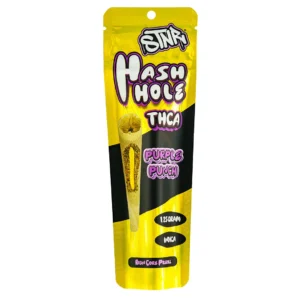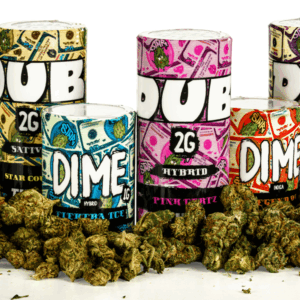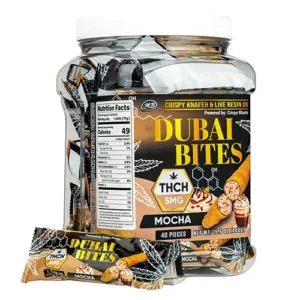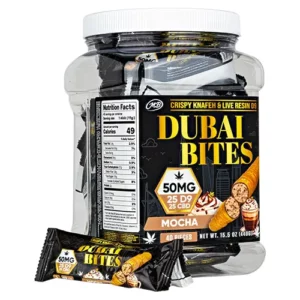In the ever-evolving world of cannabis, a new contender has emerged in the quest for potency: THCA. As enthusiasts and medical users alike seek out the most powerful strains, the focus has shifted from THC content to its precursor, THCA. But what exactly is THCA, and why are high-THCA strains becoming the holy grail of cannabis cultivation? Let’s dive into the world of cannabinoids and explore the strains that are pushing the boundaries of THCA content.
Introduction
Understanding THCA: The Precursor to THC
THCA, or tetrahydrocannabinolic acid, is the non-psychoactive precursor to THC, the compound responsible for cannabis’s famous “high.” Found in raw and live cannabis, THCA transforms into THC through a process called decarboxylation, which occurs when cannabis is heated, smoked, or vaporized. This conversion is crucial for unlocking the psychoactive effects that many users seek.
But THCA isn’t just a stepping stone to THC. It’s garnering attention for its own potential benefits. Research suggests that THCA may have anti-inflammatory, neuroprotective, and anti-emetic properties. This has sparked interest among both recreational users and medical patients looking for alternatives to traditional THC-rich strains.
The Significance of Strains with High THCA Content
High-THCA strains are becoming increasingly popular for several reasons. For medical users, these strains offer the potential for therapeutic benefits without the immediate psychoactive effects of THC. This allows for more flexible dosing and consumption methods, such as juicing raw cannabis or using THCA-rich tinctures.
For recreational users, high-THCA strains represent the pinnacle of potency. When decarboxylated, these strains can deliver an incredibly powerful experience. However, it’s crucial to approach high-THCA strains with caution, as their effects can be intense and overwhelming for inexperienced users.
The cultivation of high-THCA strains also represents a significant achievement in cannabis breeding. Growers and breeders are constantly pushing the limits of what’s possible, creating strains with THCA levels that were unheard of just a few years ago. This drive for innovation is not only expanding our understanding of cannabis genetics but also opening up new possibilities for both recreational and medicinal use.
As we explore the world of high-THCA cannabis, we’ll look at some of the top strains available, delve into the science behind THCA, and consider the legal landscape surrounding these potent varieties. Whether you’re a curious newcomer or a seasoned cannabis connoisseur, understanding THCA and its role in cannabis potency is key to navigating the modern cannabis market.
The Highest THCA Strains Available
In the quest for the highest THCA strain, cannabis enthusiasts and medical users have a variety of options to choose from. High THCA strains are becoming increasingly popular due to their potential therapeutic benefits and potent effects when decarboxylated. Let’s explore some of the top contenders in the world of high THCA strains.
Exploring the Top Contenders
While many strains boast high THCA content, it’s important to note that THCA concentrations in strains are usually between 10% and 30%. Strains with over 20% THCA are considered high-potency and offer a noticeably higher-grade experience. Here are some of the most renowned high THCA strains:
Northern Lights
Northern Lights is a classic indica strain known for its relaxing effects. While not typically the highest in THCA content, it’s still a popular choice for those seeking a potent experience. Its THCA levels can vary but often fall within the 15-20% range.
Sour Diesel
Sour Diesel, a sativa-dominant strain, is famous for its energizing effects and pungent aroma. It’s known to have high THCA levels, often reaching the 20-25% range, making it a favorite among those looking for a powerful, uplifting experience.
OG Kush
OG Kush is a hybrid strain that’s renowned for its potency. Its THCA content can vary widely depending on growing conditions and phenotype, but it’s not uncommon to find OG Kush strains with THCA levels exceeding 20%.
White Widow
White Widow is another hybrid strain that’s gained popularity for its balanced effects and high potency. While its THCA content can vary, it’s often found in the 18-25% range, placing it firmly in the category of high THCA strains.
Gelato
Gelato is a relatively new strain that’s quickly gained a reputation for its high potency. It’s not uncommon to find Gelato strains with THCA levels exceeding 25%, making it one of the highest THCA strains available.
It’s worth noting that while these strains are known for their high THCA content, the absolute highest THCA strains are often proprietary breeds. For instance, the highest THCA strain available is Secret Nature White Truffle, with a THCA concentration of 28.3%.
What Makes These Strains Stand Out?
Potency Levels and Effects
The potency of high THCA strains is their primary distinguishing factor. High-THCA strains typically contain more than 10% THCA and under 0.3% THC. This allows users to experience powerful effects when the THCA is converted to THC through decarboxylation, while still technically remaining within legal limits in some jurisdictions.
The highest percentage of THCA found in hemp flower is around 25%, with some strains containing approximately 5% other cannabinoids, resulting in a total cannabinoid percentage exceeding 30%. However, it’s important to note that the gains between 20% and 25% THCA are less noticeable, and pushing overall cannabinoid percentages considerably over 30% is not currently achievable.
Terpene Profiles and Their Impact
While THCA content is crucial for potency, the terpene profile of a strain plays a significant role in its overall effects and user experience. Terpenes are aromatic compounds that contribute to the flavor and aroma of cannabis, and they’re believed to interact with cannabinoids to produce what’s known as the “entourage effect.”
For example, Sour Diesel’s energizing effects are partly due to its high levels of limonene and pinene terpenes. OG Kush, on the other hand, often has high levels of myrcene, which contributes to its relaxing effects. The unique terpene profiles of these high THCA strains contribute to their distinct characteristics and effects, making each strain a unique experience beyond just its THCA content.
In conclusion, while the quest for the highest THCA strain continues, it’s important to consider not just the THCA percentage, but also the overall cannabinoid profile, terpene content, and desired effects when choosing a strain. The interplay of these factors creates the unique experience associated with each high THCA strain.
The Science Behind THCA
To truly understand the significance of high-THCA strains, we need to delve into the science behind THCA and its transformation into THC. This knowledge is crucial for both recreational users and those seeking potential therapeutic benefits from cannabis.
Decarboxylation: Transforming THCA into THC
THCA (Tetrahydrocannabinolic acid) is the precursor to THC (Tetrahydrocannabinol), the primary psychoactive compound in cannabis. In its raw form, THCA is non-psychoactive, meaning it won’t produce the “high” associated with cannabis use. The process that converts THCA to THC is called decarboxylation.
Decarboxylation occurs naturally over time as cannabis dries and cures, but it happens much more rapidly when heat is applied. This is why smoking or vaporizing cannabis produces psychoactive effects – the heat instantly decarboxylates THCA into THC.
It’s important to note that the conversion from THCA to THC is not 100% efficient. In fact, only 87.7% of THCA converts to Delta 9 THC when heated. This means that a strain with 25% THCA might produce around 22% THC after decarboxylation.
Understanding this conversion process is crucial for both recreational users looking to maximize potency and medical users trying to achieve specific dosages. It’s also worth noting that THCA potency is influenced by strain genetics and growing conditions, which explains why some strains consistently produce higher THCA levels than others.
The Health Benefits Associated with High-THCA Strains
While much of the focus on high-THCA strains is related to their potential to produce potent THC effects, THCA itself is being studied for its potential health benefits. It’s important to note that research in this area is still in its early stages, and more studies are needed to confirm these potential benefits.
Anti-inflammatory Properties
One of the most promising areas of research into THCA is its potential anti-inflammatory properties. Some studies suggest that THCA may help reduce inflammation in the body, which could have implications for treating conditions like arthritis, inflammatory bowel disease, and even some types of cancer.
The anti-inflammatory effects of THCA are thought to work through different mechanisms than THC or CBD, potentially offering a new avenue for treatment. However, it’s crucial to remember that these studies are preliminary, and more research is needed to fully understand how THCA might be used to treat inflammatory conditions.
Neuroprotective Effects
Another area of interest in THCA research is its potential neuroprotective effects. Some studies have suggested that THCA might help protect brain cells from damage and degeneration, which could have implications for treating neurodegenerative diseases like Parkinson’s and Alzheimer’s.
One study found that THCA showed promise in protecting against neurotoxicity in cell cultures. While this is exciting, it’s important to note that cell culture studies don’t always translate directly to effects in the human body, and much more research is needed in this area.
It’s also worth noting that these potential health benefits are associated with raw THCA, not the THC that it becomes after decarboxylation. This means that to potentially benefit from these effects, one would need to consume cannabis in its raw form, such as through juicing or consuming raw cannabis extracts.
In conclusion, while high-THCA strains are often sought after for their potential to produce potent THC effects, the THCA itself is an interesting compound with potential health benefits that are still being explored. As research continues, we may discover even more about the therapeutic potential of THCA and high-THCA strains.
Legal Considerations and Availability
The legal landscape surrounding high-THCA cannabis is complex and ever-changing. As more people become interested in the potential benefits of high-THCA strains, it’s crucial to understand the legal considerations and how to find high-quality products within the bounds of the law.
Understanding the Legal Landscape of High-THCA Cannabis
The legality of high-THCA cannabis is a gray area in many jurisdictions. While THCA itself is not a scheduled substance in most places, its potential to convert to THC complicates matters. In the United States, for example, the 2018 Farm Bill legalized hemp and hemp-derived products containing less than 0.3% THC. However, this legislation doesn’t explicitly address THCA content.
Some producers have taken advantage of this loophole to create high-THCA hemp flower that technically falls within legal limits. These products contain high levels of THCA but less than 0.3% THC. However, it’s important to note that once heated or decarboxylated, these products would likely exceed legal THC limits.
The legal status of high-THCA cannabis can vary significantly from state to state and country to country. In some areas, it may be fully legal, while in others, it might be restricted to medical use or completely prohibited. Always check your local laws before purchasing or using high-THCA products.
Finding Legal, High-Quality High-THCA Strains
For those in areas where high-THCA cannabis is legal, finding high quality THCA flower can be a challenge. Here are some tips for finding the best places to buy THCA flower:
- Licensed Dispensaries: In states with legal cannabis markets, licensed dispensaries are often the best places to buy THCA flower. These establishments are regulated and typically offer lab-tested products, ensuring you’re getting what you pay for.
- Online Retailers: Some online retailers specialize in hemp-derived products, including high-THCA flower. When choosing the best THCA flower vendor, look for companies that provide third-party lab results and have positive customer reviews.
- CBD Shops: Some CBD shops in states with more lenient cannabis laws may carry high-THCA products. However, always verify the legality in your area before making a purchase.
- Direct from Growers: In some areas, you may be able to purchase directly from licensed growers. This can be a great way to get fresh, high-quality products.
When searching for high quality THCA flower, consider the following:
- Lab Testing: Reputable vendors should provide third-party lab results that verify the THCA content and confirm the absence of contaminants.
- Strain Information: Look for vendors who provide detailed information about their strains, including genetics and growing methods.
- Customer Reviews: Check reviews from other customers to get an idea of the vendor’s product quality and customer service.
- Transparency: The best THCA flower vendors are transparent about their sourcing and production methods.
Remember, while high-THCA products may be technically legal in some areas, the legal landscape is complex and constantly evolving. Always prioritize purchasing from reputable, licensed vendors who comply with local laws and regulations.
It’s also worth noting that the availability of high-THCA strains can vary greatly depending on your location. In some areas, you may have access to a wide variety of strains, while in others, options may be more limited.
Ultimately, finding legal, high-quality high-THCA strains requires careful research and consideration of your local laws. Always prioritize safety and legality in your pursuit of these potent cannabis products.
Concluding Thoughts: Navigating the World of High THCA Strains
As we’ve explored throughout this article, high THCA strains represent an exciting frontier in cannabis cultivation and consumption. These potent varieties offer unique benefits and experiences for both recreational and medicinal users. However, navigating this world requires careful consideration of safety, legality, and personal needs.
Maximizing Benefits While Ensuring Safety and Compliance
When it comes to high THCA strains, the potential benefits are significant, but so are the risks if not approached responsibly. Here are some key points to keep in mind:
- Start Low and Go Slow: If you’re new to high THCA strains, begin with a small amount and gradually increase as you become familiar with the effects. Remember, these strains can be incredibly potent when decarboxylated.
- Know Your Source: Always purchase from reputable, licensed vendors who provide third-party lab results. This ensures you’re getting a safe, high-quality product that complies with local regulations.
- Understand the Law: The legal status of high THCA cannabis can be complex and varies by location. Stay informed about the laws in your area to ensure compliance.
- Consider Consumption Methods: Raw THCA has different effects and potential benefits compared to decarboxylated THC. Choose your consumption method based on your desired outcomes.
- Be Aware of Tolerance: Regular use of high THCA strains can lead to increased tolerance. Monitor your usage and take breaks if needed to maintain effectiveness.
By following these guidelines, you can maximize the benefits of high THCA strains while minimizing risks and staying within legal boundaries.
The Future of Cannabis Breeding and High-THCA Varieties
The world of cannabis breeding is constantly evolving, and high THCA strains are at the forefront of this innovation. As we look to the future, several trends and possibilities emerge:
- Increased Potency: Breeders will likely continue to push the boundaries of THCA content, potentially developing strains with even higher concentrations than we see today.
- Targeted Terpene Profiles: Future breeding efforts may focus on combining high THCA content with specific terpene profiles to enhance or target particular effects.
- Medical Applications: As research into THCA’s potential health benefits continues, we may see the development of strains specifically bred for medical use, emphasizing THCA content alongside other beneficial cannabinoids.
- Legal Adaptations: The cannabis industry may continue to develop strains that push the boundaries of legality, such as high-THCA hemp strains that technically fall within legal THC limits.
- Improved Cultivation Techniques: Advancements in growing technology and techniques may lead to more efficient production of high THCA strains, potentially making them more accessible and affordable.
- Consumer Education: As the market for high THCA strains grows, we’ll likely see increased efforts to educate consumers about their unique properties, benefits, and potential risks.
While the future of high THCA cannabis is exciting, it’s important to remember that responsible use and ongoing research are crucial. As consumers, staying informed about developments in cannabis science and policy will be key to making the most of these potent strains
In conclusion, high THCA strains represent a fascinating intersection of cannabis science, cultivation, and consumer interest. Whether you’re a recreational user seeking potent effects, a medical patient exploring potential benefits, or simply a cannabis enthusiast interested in the cutting edge of the industry, understanding high THCA strains is increasingly important. As always, approach with caution, stay informed, and prioritize safety and legality in your cannabis journey.










